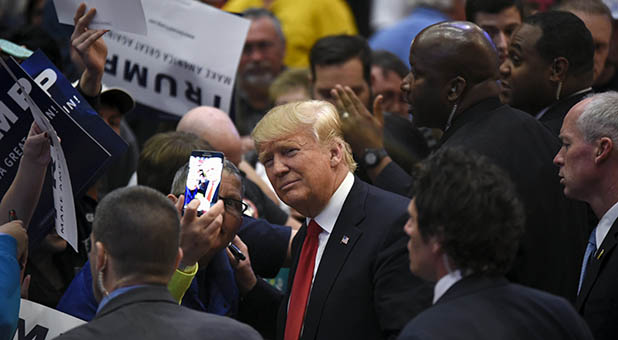Theologian: Donald Trump Is Attracting ‘Cultural Evangelicals’
Dr. Anthony Bradley, chair of the Religious and Theological Studies program at King’s College in New York, says Donald Trump has given voice to evangelicals who have been on the political margins in the past.
During an interview with the Christian Post published Saturday, he said these “cultural evangelicals” are mad at President Obama for ruining the country. They’re also mad at those in the Washington establishment who have failed to stop the president. And for the first time, they’re delivering a loud and resounding message at the polls.
“They are mad because they see that their jobs have been lost to globalization,” he said. “They fear the threat of loose immigration in terms of how it affects their own neighborhoods. In terms of things like jobs … they are extremely distrustful of politicians.”
Bradley said these evangelicals have “had it” with Washington, D.C., and with “politics as usual.” They also can’t stand outside special interests from lobbyists, and as a result, Marco Rubio and Ted Cruz both represent the establishment they can’t stand.
“So Donald Trump is speaking right to the heart and core concerns of the types of evangelicals that have been ignored probably over the last 10 to 15 years,” he told CP Politics‘ Leonard Blair.
“The kinds of concerns that the establishment evangelicals, the institutional evangelicals care about are the kinds of issues that people like Cruz and Rubio are speaking to. The kinds of issues that Trump evangelicals care about, the establishment and institutional evangelicals do not really address,” he said. “These are primarily working-class and lower-middle-class people who want the America back that they grew up in. They want the America back where there were jobs in smaller towns. They want the America back where there wasn’t that sort of liberal encroachment on all sorts of institutions from public schools and churches. They want the America back that gives them and their children the projection that they’ll be able to make it in small-town America. They want that America back and Donald Trump speaks directly to those concerns.”
Bradley said that when Trump uses his campaign slogan, “Make America Great Again,” he’s speaking directly to the core concerns of evangelicals who “care more about America than they do evangelicalism.” As a result, they don’t need him to be a moral leader; they don’t care about the number of divorces he’s had.
“They don’t care about his character; they care about the fact that he finally speaks for them,” he said. “Finally they have someone who articulates the sorts of fears and cares and concerns that the establishment and institutional evangelicals have been slow to care about and respond to and to do it in such a way that makes them believe that there is hope for real change.”
Dr. Richard Land, president of the Southern Evangelical Seminary and executive editor of The Christian Post, in the same article, countered that Trump’s presidential campaign has been fueled by “irrational populism.” He also questioned the authenticity of Trump supporters who self-identify as evangelicals, saying the Bible doesn’t call on Christians to be pragmatic.
“I vote my values, my beliefs and my convictions, I’m not pragmatic,” he said. “Which means I don’t compromise my values, beliefs and convictions for what I may perceive to be my own narrow self-interests. I don’t see pragmatic in the New Testament, I see being salt and light.”
















































